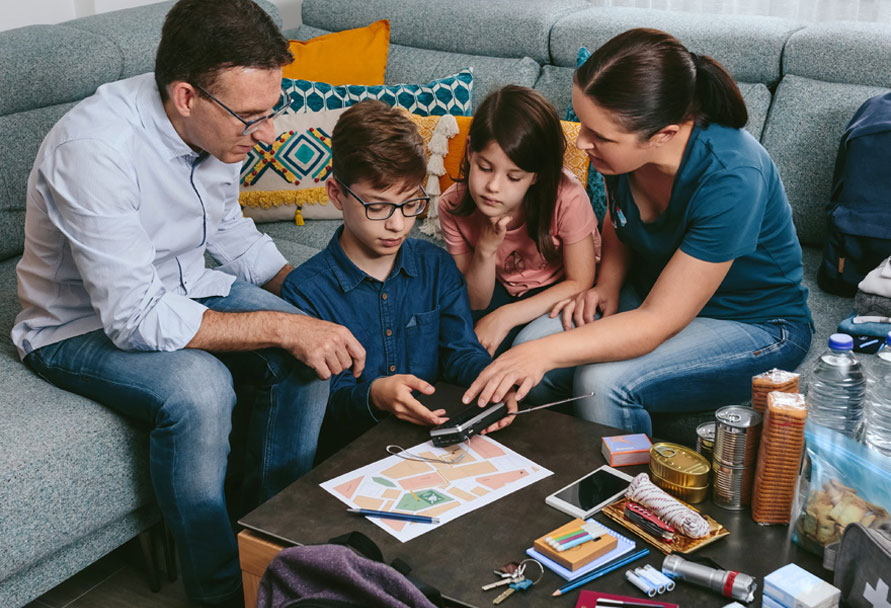Emergency Public Safety Power Shutoff
At Black Hills Energy, your safety is our top priority. When conditions increase wildfire risk, we may temporarily turn off power in high-risk areas to protect you and our communities. This is called an Emergency Public Safety Power Shutoff (PSPS).
We understand that any power outage can be disruptive. Our goal is to keep you informed, prepared and safe.
What is an Emergency PSPS?
An Emergency Public Safety Power Shutoff (PSPS) is a last-resort safety measure where we selectively and proactively shut off power to reduce the risk of wildfires. This may happen when conditions create a high risk of wildfires.
Is there an Emergency PSPS in your area?
If you're unsure if a PSPS has been called for your area, more information can be found on the event update page. We will provide updates on any PSPS events as soon as they become available.
What happens before, during and after a PSPS?
- PSPS Watch: We’ll issue a watch when conditions indicate a potential need for a shutoff.
- PSPS Warning: A warning is issued when a shutoff is likely.
- Power is off: Power is temporarily shut off in affected areas to reduce wildfire risk.
- Restoration: Begins when conditions improve and it’s safe for crews to inspect equipment and make necessary repairs.
- Power restored: Once it’s safe to restore service, we’ll notify customers that power has been turned back on.
How to stay informed
We’re committed to keeping you informed before, during and after an Emergency PSPS event. We will strive to provide advance notice, but if conditions change quickly, we may need to shut off power with little or no warning.
Emergency PSPS notifications will occur through:
- Phone calls
- Emails
- Text messages
- Social media
- Media outlets
- Our website
To receive these notifications, please make sure your contact information is up to date.
You can view our outage map for real-time updates of any outage, including an Emergency PSPS.
Emergency PSPS affected area maps
We've identified certain areas across our service region that may be subject to an Emergency PSPS when high-risk fire conditions threaten our ability to safely operate the electric grid.
Power restoration
We’ll work as quickly as possible to safely restore service. Restoration begins only when conditions have improved and it’s safe for our crews to begin work. Power will not be turned back on immediately. Before restoring service, our crews must inspect all equipment and facilities in the affected area and make any necessary repairs.
Depending on the extent of damage and the size of the area impacted, outages may last several hours or, in some cases, multiple days. We will bring in additional crews as needed and work until power is fully restored.
How to prepare
Preparation is key to staying safe during a power outage, including an Emergency PSPS.
- Create an emergency kit with flashlights, batteries, water and non-perishable food.
- Plan for medical needs, including backup power for essential devices.
- Identify alternate charging options for phones and devices.
- Review local resources such as community centers and emergency shelters.
Find more ways to stay safe and be prepared.
Customers with medical needs
- For medical emergencies, call 911.
- Have a backup plan for medicine that needs to be refrigerated or medical equipment that is powered by electricity. This could mean finding a place to go during an outage or having a backup generator.
- You can add a friend, family member or caretaker to your account to receive outage alerts on your behalf.
Business and commercial customers
- Confirm that your business account is set up to receive outage notifications via phone call, text or email.
- Add additional individuals to your account so that others may receive outage alerts. Designate additional notification recipients.
- Review your electrical outage emergency plans and consider backup power solutions for your facility.
Frequently asked questions
What is an Emergency Public Safety Power Shutoff (PSPS)?
An Emergency PSPS is a last-resort safety measure used to reduce wildfire risk. It involves proactively turning off power in specific high-risk fire areas when conditions threaten the safe operation of the electric grid.
How will I be notified?
We’ll notify customers through phone calls, emails, text messages, social media, media outlets and our website. Check your online account and make sure your contact information is up to date.
Will I be billed during a PSPS outage?
No. You won’t be charged for energy you didn’t use, but monthly fixed charges may still apply. These are base charges that help maintain infrastructure and services.
How long will the power be out?
Outages may last several hours or multiple days depending on weather conditions and damage. Power will only be restored once it’s safe and equipment has been inspected and repaired.

